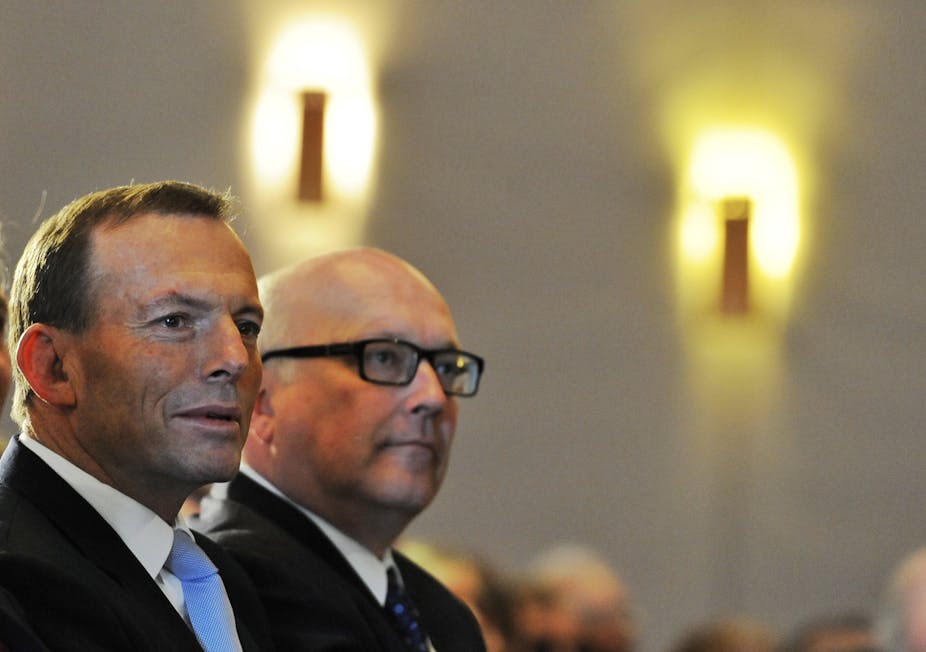As politics heightens in the decreasing count down to the 2013 Federal election, the opposition is laying its cards on the table.
Always on the cards since the Institute for Public Affairs, a right-wing think tank, began a fund-raising campaign for Andrew Bolt in defense of his racial vilification case, Coalition Leader Tony Abbott has delivered to his ideological heartland with a commitment to remove key elements of Section 18C of the Race Discrimination Act (RDA).
Section 18C, known as the racial vilification provision, was introduced in 1996 with opposition agreement in the dying days of the Keating government to make race hate speech unlawful (not illegal). Ever since 1966 when the Holt government signed onto the International Convention for the Elimination of All Forms of Racial Discrimination (ICERD) while filing a reservation on Article 4 (the outlawing of race hate speech), the position of vilifying speech on the Australian political agenda has been contentious and often murky.
The states and the Commonwealth have overlapping jurisdiction, and civil and criminal laws apply in differing ways in different states. It is a mess, and one that the Commonwealth alone cannot clean up.
The specific Commonwealth legislation requires the offended party (who has to be able to show that they are offended, vilified etc.) to seek conciliation with the offending party through the Australian Human Rights Commission (AHRC).
The AHRC cannot act on its own bat in the public interest against racist materials. Only if no agreement can be reached does the AHRC declare it cannot conciliate and refers the case to the Federal Court for arbitration. When Andrew Bolt and the Herald Sun told Pat Eatock and her Aboriginal colleagues who sought conciliation to get lost, they had no other recourse but seek a court judgement.

Once they started down the RDA path (with little likelihood of anything other than an apology and costs), they had to put aside any common law actions for Mr Abbott’s preferred option of defamation (with the potential for serious damages).
Under the headline “Freedom Wars”, Abbott portrayed himself as a crusader facing the Saracens in the Holy Land. (Note, for hyperbolists, a war for freedom is being fought in Syria, not Australia).
He went on to argue that “Freedom of speech empowers Christians, Muslims, Jews, …. everyone and anyone publicly to affirm whatever it is that is important to their identity.”
True; but Section 18C only restrains them from saying anything they wish about each other, if what is important to them depends on discourses of vilification.
In making his attack on government plans to “regulate” the news media, Mr Abbott argued: “The more powerful people are, the more important the presumption must be that less powerful people should be able to say exactly what they think of them”.
Given this logic, the converse should also hold – “the less powerful people are, the more important the presumption that more powerful people should not be able to say exactly what they think of them”.
Abbott’s initiative, licensing as it does people who wish to have no limit on their opportunities “to offend, insult, humiliate or intimidate”, has the apparent full support of his communications spokesperson Malcolm Turnbull. Turnbull’s office told The Conversation that Turnbull was “fully behind the statement” and that he had previewed and approved it.
When John Howard managed to alienate much of the Asian and Muslim communities of Sydney with his perceived support for Pauline Hanson, it took the Liberals under Barry O’Farrell many years to draw them back towards the Coalition. It paid off as the March 2011 state election demonstrated.

Yet Mr Abbott seems to have decided to potentially alienate these same groups once more. He has offered the added bonus of the Jewish community, the backbone of Turnbull’s Wentworth electorate, who have been the main users of 18C against Holocaust deniers, anti-Semites and racist agitators.
In the Executive Council of Australian Jewry submissions to the Attorney General Roxon’s consolidation review of human rights legislation, and to Race Discrimination Commissioner Helen Szoke’s Anti-Racism strategy, the ECAJ has pointed to the rising waves of anti-Semitism in Australia, the use of the internet for the dissemination of racist propaganda, and the insufficiency of Commonwealth legislation as it stands.
The government’s consolidation process appears rather disconnected and unfocused, with major problems still evident; a significant worry was that 18C would be dissolved [behind a word-wall of obfuscation](https://theconversation.com/a-flawed-and-limited-plan-australias-human-rights-failures-to-continue-5510](https://theconversation.com/a-flawed-and-limited-plan-australias-human-rights-failures-to-continue-5510).
However, in response to Abbott’s speech, Roxon has said that the consolidated human rights legislation will be raised to the “highest possible standard”.
However her government recently withdrew its planned accession to the European Cybercrime Optional Protocol on Cyberracism, despite clear evidence Australia’s current regimes were inadequate, suggesting that the standards would not be quite as high as many might have hoped.
While Abbott’s speech is clearly a pay-off to the IPA, it also appears as a double-wedge: it places Turnbull in an invidious situation with his own constituency, and it seeks to wedge the government on freedom of speech issues just as the regulation of media debate reaches the boil. It may or may not represent his own viewpoint. It is also not clear whether this is a core promise, or simply rising chatter directed towards the hard edge of the conservative support.

Removing Section 18C without any replacement will open Australia to an even more thorough critique than that offered in 2011 by the United Nations Human Rights Committee. Of course, as under the Howard government, an Abbott government may well tell the UN to butt out.
What the IPA speech does is to direct public attention to what the rhetoric and the reality of human rights would look like under a returned Coalition government, with Senator Brandis as the potential Attorney General.
This is not something we’ve really seen displayed, and it adds an important dimension to the emerging Australian future being planned by the opposition.

